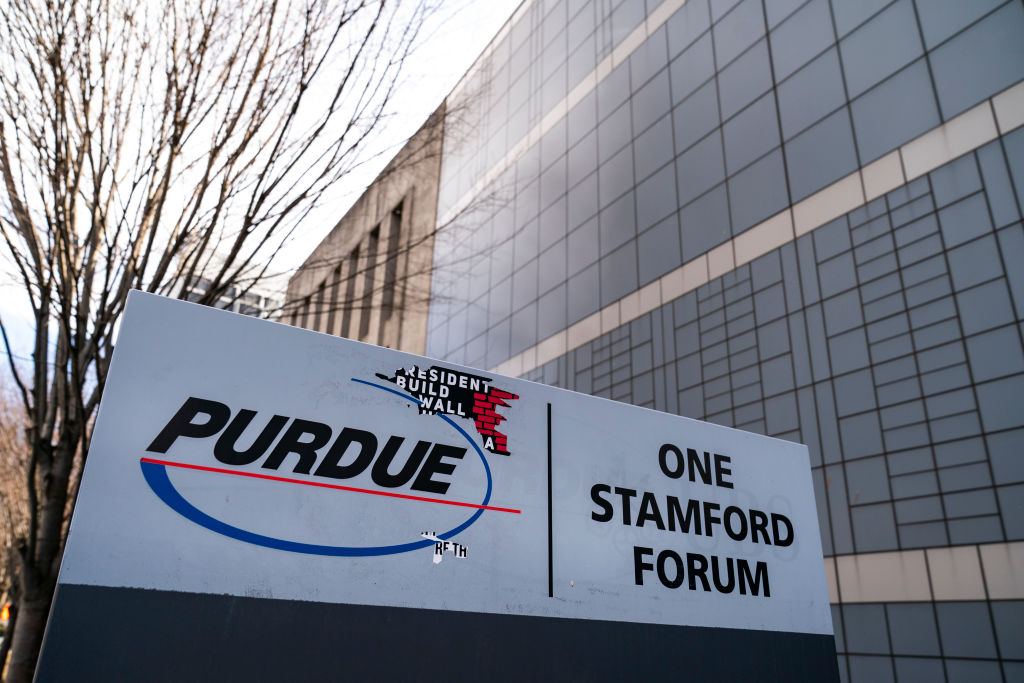Purdue Pharma pleads guilty to criminal charges, admits role in opioid epidemic


A free daily email with the biggest news stories of the day – and the best features from TheWeek.com
You are now subscribed
Your newsletter sign-up was successful
Purdue Pharma, which produces on OxyContin, on Tuesday admitted its role in the growth of the United States' opioid epidemic, pleading guilty to a set of criminal charges as part of a settlement with the federal government, The Associated Press reports.
The guilty plea included admissions that the pharmaceutical giant impeded the Drug Enforcement Administration's efforts to combat the opioid crisis. The company admitted it failed to maintain an effective program (despite assuring the DEA otherwise) focused on preventing prescription drugs from making it onto the black market. It provided the agency with misleading information so it could boost manufacturing quotas, and paid doctors through a speakers program as incentive for them to write more painkiller prescriptions.
The company will pay the federal government $225 million in the settlement, which is just a fraction of the $8.3 billion it owes in penalties and forfeitures. Paying the smaller amount is dependent on Purdue executing settlements while moving through bankruptcy court with state and local governments, and other groups that are also suing the company.
The Week
Escape your echo chamber. Get the facts behind the news, plus analysis from multiple perspectives.

Sign up for The Week's Free Newsletters
From our morning news briefing to a weekly Good News Newsletter, get the best of The Week delivered directly to your inbox.
From our morning news briefing to a weekly Good News Newsletter, get the best of The Week delivered directly to your inbox.
Many of the other plaintiffs are unsatisfied with the settlement, AP notes, especially because members of the Sackler family who own Purdue are not facing criminal charges and, despite owing the U.S. government millions and giving up control of the company, will not see their overall wealth affected significantly. Several state attorneys general also oppose Purdue's plans for future settlements, which include transforming into a public benefit corporation that would use its proceeds to address the opioid crisis. Read more at The Associated Press.
A free daily email with the biggest news stories of the day – and the best features from TheWeek.com
Tim is a staff writer at The Week and has contributed to Bedford and Bowery and The New York Transatlantic. He is a graduate of Occidental College and NYU's journalism school. Tim enjoys writing about baseball, Europe, and extinct megafauna. He lives in New York City.
-
 Political cartoons for February 20
Political cartoons for February 20Cartoons Friday’s political cartoons include just the ice, winter games, and more
-
 Sepsis ‘breakthrough’: the world’s first targeted treatment?
Sepsis ‘breakthrough’: the world’s first targeted treatment?The Explainer New drug could reverse effects of sepsis, rather than trying to treat infection with antibiotics
-
 James Van Der Beek obituary: fresh-faced Dawson’s Creek star
James Van Der Beek obituary: fresh-faced Dawson’s Creek starIn The Spotlight Van Der Beek fronted one of the most successful teen dramas of the 90s – but his Dawson fame proved a double-edged sword
-
 Trump HHS slashes advised child vaccinations
Trump HHS slashes advised child vaccinationsSpeed Read In a widely condemned move, the CDC will now recommend that children get vaccinated against 11 communicable diseases, not 17
-
 A fentanyl vaccine may be on the horizon
A fentanyl vaccine may be on the horizonUnder the radar Taking a serious jab at the opioid epidemic
-
 Nitazene is quietly increasing opioid deaths
Nitazene is quietly increasing opioid deathsThe explainer The drug is usually consumed accidentally
-
 FDA OKs generic abortion pill, riling the right
FDA OKs generic abortion pill, riling the rightSpeed Read The drug in question is a generic version of mifepristone, used to carry out two-thirds of US abortions
-
 RFK Jr. vaccine panel advises restricting MMRV shot
RFK Jr. vaccine panel advises restricting MMRV shotSpeed Read The committee voted to restrict access to a childhood vaccine against chickenpox
-
 The UK’s opioid crisis: why the stats don’t add up
The UK’s opioid crisis: why the stats don’t add upThe Explainer A new report has revealed that the UK’s total of opioid-related deaths could be much greater than official figures show
-
 Texas declares end to measles outbreak
Texas declares end to measles outbreakSpeed Read The vaccine-preventable disease is still spreading in neighboring states, Mexico and Canada
-
 RFK Jr. shuts down mRNA vaccine funding at agency
RFK Jr. shuts down mRNA vaccine funding at agencySpeed Read The decision canceled or modified 22 projects, primarily for work on vaccines and therapeutics for respiratory viruses
